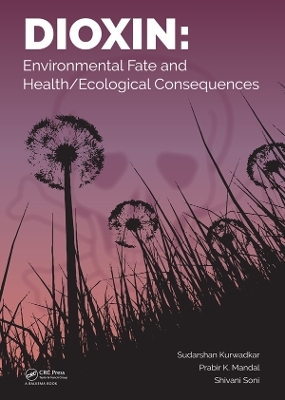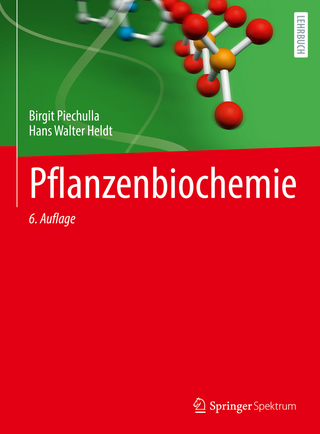
Dioxin
CRC Press (Verlag)
978-1-138-04724-2 (ISBN)
Dioxin – Environmental Fate and Health/Ecological Consequences offers a unique, and comprehensive coverage of dioxins and their congeners once they are released to the environment. The book provides readers with a systematic understanding of past and emerging sources of dioxins, current dioxins inventories and historical trends, fate and long-range transboundary atmospheric transport, human health, and ecological risk and regulatory perspective. Providing an excellent analysis of dioxin exposure through the food chain and impact on human health, it also documents the environmental implications of dioxins on ecological flora and fauna.
The book offers readers a holistic understanding about dioxins, their atmospheric fate and transport, distribution in various environmental matrices and various routes and exposure pathways through which human beings are exposed to this persistent organic pollutant. It further offers an insight into the toxicological profile and mechanistic analysis of the onset of cancer, remediation technologies, and existing regulatory framework to deal with the problems associated with dioxins.
The book will serve as an excellent resource to environmental professionals, particularly environmental toxicologists, environmental health professionals, remediation engineers, environmental regulatory agencies, policymakers, and environmental law professionals.
Dr. Sudarshan Kurwadkar is an Assistant Professor in the Civil and Environmental Engineering Department at California State University, Fullerton. He is a Board Certified Environmental Engineer and a licensed Professional Engineer. Prior to his academic career, he worked in the Division of Environmental Quality with the Missouri Department of Natural Resources. His research interests are in the broadly defined area of fate and transport of emerging contaminants in aquatic and terrestrial environment. Dr. Kurwadkar received his Ph.D. in Civil Engineering with Environmental Engineering emphasis from the Missouri University of Science and Technology (Formerly University of Missouri – Rolla). He is a Board Certified Environmental Engineer and a licensed Professional Engineer in the states of Texas, Ohio and Missouri. Dr. Kurwadkar actively engages undergraduate and graduate students in research activities in the areas of environmental fate and transport of emerging micro-pollutants such as pharmaceuticals and neonicotinoid class of insecticides. He is an active researcher and maintain cross-collaborative research network and disseminates environmental engineering education. Besides teaching and research, he enjoys outdoor activities such as kayaking and fishing. This book is the result of his continued research collaboration. Dr. Prabir K. Mandal, Ph.D. (Genetics) is a full Professor at Edward Waters College, Jacksonville, FL. He joined EWC as an Associate Professor of Biology in 2008 and served as the Interim Chair of the Biology Department until 2010. Dr. Mandal initiated and made an articulation agreement between EWC-Life University and EWC-Palmer College of Chiropractic for a dual degree i.e. B.S. in Biology and Doctor of Chiropractic for EWC students majoring in biology. He serves an instrumental role in getting our students into the summer internship for Bioinformatics at Mississippi Valley State University and for the Florida Alliance for Health Professions Diversity. He serves as the Chair of the Institutional Review Board of EWC, executive members of the editorial board of a few peer reviewed journals of international repute. He has been awarded with the Distinguished Professor of the College during 2012-2013 and President’s Ideal Faculty in 2010 for excellence in teaching, research, scholarship, service, adhering to policy and for taking initiative to advance the college through program development. Dr. Mandal has been awarded with several travel awards to attend national and international scientific meetings viz., "7th Annual Conference on Understanding Interventions that Broaden Participation in Research Careers" in San Diego, CA in May 2015; Science of Global Prostate Cancer Disparities in Black Men held at Montego Bay, Jamaica in November 2014; CHAAMP conference at the National Academy of Sciences, Washington, DC in June 2013. He has developed the course BIO 290 "African-American Health", the one and only African-American health related course being taught in the State of Florida. He has published numerous research papers, editorials, book chapters, book, and made scholarly presentations in national/international scientific meetings exclusively related to the health issues of the African-Americans. He served as the lead editor of "Molecular Biomarkers: Tools in Medicine" a special edition of BioMed Research Internal and also serves as editor-in-chief of "Diagnostic and Preventive Biomarkers" a special issue of the journal "International Journal of Prevention and Treatment". He is also the reviewer of original research papers submitted to a number of peer-reviewed journals of international repute. He has been awarded several research projects (one from the Department of Health Biomedical Research Program, State of Florida for $50,000, National Library of Medicine; the National Library of Medicine-National Institute of Health for $20,000 and a few smaller grants from Florida Sea Grants including Elise B. Newell Seminar series awards) also exclusively related to the African-American Health. Dr. Mandal is the Principal Investigator/Liaison of Edward Waters College chapter for the $1.6 M research project titled "OneFlorida Cancer Control Network (CCN)" awarded to Dr. Elizabeth Shenkman, P.I. of University of Florida by Florida Department of Health Biomedical Research program. He also serves as the member of the CCN Executive Steering Committee and Scientific Advisory Committee. He is part of the Research Advisory Council of Florida State Health Diversity Research. He has research collaboration(s) with (1) the nutrition program at the University of North Florida, (2) NSF proposal on the development and application of clinical courses with problem based learning in the undergraduate curriculum, (3) NIH proposal R25 grant for Florida Minority Oncology Research Education (MORE) program on prostate cancer research consortium with the University of Florida. He also serves as a member of the steering committee for the Health Equity Research Institute, and is a member of the Health Disparity Research Advisory Committee, Florida. Dr. Mandal is seriously involved in curriculum reform, mentoring and spearheading new initiatives for Allied Health education focusing on the underserved minority population specifically African-Americans in the State of Florida. Dr. Mandal is the Editor-in-Chief of the Journal of Bioprocessing & Biotechniques (ISSN: 2155-9821) and serving as the member of the editorial board of World Environment (ISSN: 2163-1581), Voyager (ISSN: 0976-7436), Bionature (ISSN: 0970-9835), SDRP Journal of Microbiology & Virology and World Research Journal of Biotechnology (ISSN: 2322-0600). Dr. Mandal is serving as the organizing committee member of 4th International Conference on Bioprocessing and Biosystems Engineering 2016 (Texas), World Bioenergy Congress and Expo 2016 (Rome, Italy) and 12th Euro Biotechnology Congress 2016 (Alicante, Spain). Dr. Mandal has also been invited as a speaker of the session at the 2nd Annual World Congress of Smart Materials-2016 (Singapore), 7th World Gene Convention 2016 (Shanghai, China), and 3rd Annual PCS Global Cancer Conference 2016 (Marrakesh, Morocco). Dr. Shivani Soni currently works as a lecturer at California State University, Fullerton. She worked as an Associate Professor in Department of Biological Sciences at Alabama State University till July 2016. She received her PhD in Molecular Parasitology in 2004 from University of Delhi, India. During her postdoctoral training at Tufts School of Medicine, Boston, Massachusetts she pioneered in characterizing the in vivo role of novel protein Erythroblast Macrophage protein (Emp) in red blood cells and macrophage development. Later she joined the Health Science & Technology division of Harvard Medical School-MIT and the Department of Medicine at Brigham and Women’s Hospital, Boston, Massachusetts as a senior postdoctoral fellow. In collaboration, she has developed several novel polymeric hybrid nanoformulations for cancer chemotherapy and targeting aberrant signal transduction pathways which has led to many publications in peer reviewed journals, book chapters as well as patents. Dr. Soni is the recipient of Health Disparity Research & Training (HDRTP) Scholar Award from Minority Health and Health Disparity Research Center (MHRC) at the University of Alabama (2015-2017) to incorporate community-based research, focusing on health disparities for minority population in my cancer related studies. Dr. Soni is the reviewer of many journals related to Hematology, Oncology and Biochemistry and editor of two already published books "Handbook of Research on Recent Advancement in Cardiovascular Diseases," and "Handbook of Research on Diverse Applications of Nanotechnology in Biomedicine, Chemistry and Engineering" published by IGI Global. Dr. Soni is passionate about teaching graduate and undergraduate students and mentored postdoctoral fellows, graduate, medical, masters and undergraduate students.
Overview. Occurrence, Fate and Distribution of Dioxin in the Environment. Dioxin Usages and Abuses: A Historical Perspective. Dioxin in Food. Environmental occurrence and Distribution of Dioxin. Fate and Transport of Dioxin. Deposition of Dioxin in Environmental Biota. Toxicity of Dioxin: Implication to Human Health & the Environment. Toxicity of Dioxin to Aquatic Microorganisms. Dioxins and Cancer: Detailed Insight into the Mechanism. The Epigenetic Effects of Dioxin. Toxic Response of Dioxin in Aquatic Biota. Human Health Toxicity due to Exposure to Dioxin. Long-term Persistence, Bio-accumulation and Vulnerability Assessment of Aquatic Species Exposure to Dioxin. Human Health Consequences of Chronic Exposure to Dioxin. Remediation of Dioxin: Past, Present and Future. Remediation of Dioxin Contaminated Media Prospects and Challenges. Biological Treatment for Removal of Dioxin in Environmental Media. Removal of Dioxin using Nanomaterials as an Adsorbents. Physicochemical Processes and Remediation of Dioxin – A review. Photocatalytic Degradation of Dioxin. Emerging Technologies for In-situ Remediation of Dioxin Contaminated Soil, Sediment and Groundwater. Remediation of Dioxin: Proven Case Studies. Case Study – I. Case Study – II. Case Study III. Analytical Determination of Dioxin in Environmental Matrices. Detection of Dioxin in Environmental Matrices – Established and Emerging Technologies. Innovative Analytical Techniques for Determination of Dioxin. Indices.
| Erscheinungsdatum | 20.12.2019 |
|---|---|
| Verlagsort | London |
| Sprache | englisch |
| Maße | 174 x 246 mm |
| Gewicht | 566 g |
| Themenwelt | Naturwissenschaften ► Biologie ► Biochemie |
| Technik ► Umwelttechnik / Biotechnologie | |
| ISBN-10 | 1-138-04724-4 / 1138047244 |
| ISBN-13 | 978-1-138-04724-2 / 9781138047242 |
| Zustand | Neuware |
| Haben Sie eine Frage zum Produkt? |
aus dem Bereich


